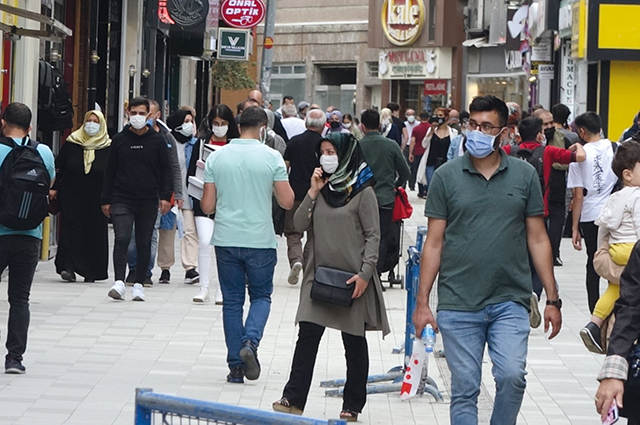This week, the situation in Georgia’s epidemiology has improved, with a decrease in both newly detected daily cases as well as fatalities. Since Monday, the number of deaths reported on a daily basis has decreased from 80 to 60.
The Statistics
Georgia reported 1120 cases of coronavirus, 4905 recoveries and 61 deaths as a result 16149 tests were conducted on Monday, Sept. 6. Tbilisi, the capital of Georgia, recorded the most cases with 415 Covid-19, followed by Imereti with 175 and Kakheti with 147.
On Tuesday, a total 25,624 tests were conducted, with 65 new cases, 3996 recovery, and 50 deaths recorded. Tbilisi recorded 651 Covid-19 infections, followed by Imereti with 288 and Adjara with 201.
As a result, the country reported 2571 cases of coronavirus, 3668 recoveries and 60 deaths as a result 29 449 tests conducted on Wednesday. Tbilisi had the highest number of Covid-19 cases (918), followed by Imereti with 414 and Kakheti with 242.
On Thursday, Georgia reported 2455 cases of coronavirus, 4427 recoveries and 58 deaths. In the previous 24 hours, 36,151 tests had been conducted across the country. Tbilisi, the capital of Georgia, recorded the most Covid-19 cases (890), followed by Imereti with 342 and Adjara with 249, respectively.
Since February 2020, Georgia has recorded 572,948 cases. Of these, 531.764 people recovered, and 8035 died.
The daily test-positivity is 6.69%.
Currently, 365 of the 1500 critically ill patients require artificial ventilation.
The Restrictions
The local authorities have announced that they will be lifting several COVID restrictions in the future due to the reduction of daily reported coronavirus infections.
The municipal public transport system will be restored as of September 13.
From October 4, it is expected that in-person learning will resume at schools and universities. Tamar Gabunia, Deputy Minister of Health, said that the improved vaccination rates among teachers made it possible to resume in-person education from this date. She said that the vaccination rate of students in universities is not very high. This is why she urges them to get vaccinated as soon as possible.
Nevertheless, some restrictions remain in place. The Council has decided, in particular, that sports tournaments will be held without spectators and that participants must be vaccinated, or have negative results from a PCR test performed within the last 72-hours or an antigen testing valid for 24 hours.
Both indoors and out, wearing a mask is mandatory.
The holding of events like weddings, funerals etc. It is still illegal to hold events such as weddings, funerals, etc.
The Vaccine
As of Thursday, 1,405,877 individuals had received the coronavirus vaccine, with an average daily dose of 24,670.
A lottery will be launched on September 13 to encourage vaccination. The lottery company will randomly select vaccinated individuals to receive cash prizes. Daily and weekly winners will be announced, and the final raffle will take place at the end the year.
The state will provide free lottery tickets to those who receive vaccinations for the StopCovid Lottery.
A ticket obtained during the StopCovid Lottery Vaccination will be valid for all raffles up to the time the ticket wins.
The minimum prize is 100 GEL, and the maximum is 100 000 GEL. Daily, approximately 160 prizes will be raffled. The daily raffle results will be announced at 12 noon every day. Weekly raffle winners will also be announced each Monday at the end of the weekly raffle.
A specially designed website will inform the citizens about the prizes they have won. The Ministry of Health will also contact them.
“Winners may obtain information at stopcov.lotto.ge. The information about the winners, including the names and first initials of their last name, as well as the city and vaccine they were vaccinated with will be displayed. The booking code will be displayed. The Ministry of Health is certain to contact the winners, and inform them of their win,” said Ketevan Khutsishvili, the head of Georgian National Lottery’s Legal Department.
The Situation Abroad
The COVID situation in Georgia and its neighboring countries is still a challenge.
Russia
“Russia reported 18024 new cases of coronavirus and 797 deaths on Tuesday. The RBC website reported Monday that Aeroflot, Russia’s flagship carrier, suspended several pilots after they refused to be vaccinated against the coronavirus.
The Moscow Times reports that top health officials in Russia have warned that a new outbreak of coronavirus could occur as soon as this month.
Slovakia
Reports said that Slovakia will stop using the Sputnik V vaccine from Russia due to a low demand in its population. The EU member’s decision to approve a Russian vaccine before EU approval caused a political uproar, which led to the resignation by the Slovakian prime minister.
Azerbaijan
Azerbaijan’s capital Baku has seen the highest increase in COVID-19 cases. The website koronavirusinfo.az reported that the city accounts for 54.6% all coronavirus infections in the country.
“Also in the country, the infection cases were 13.3% Absheron, 11,8% Aran, 6,9% Ganja-Gazakh, 3.7% Shaki-Zagatala, 3% Guba-Khachmaz, 2.6% Lankaran, 2.4% Mountain Shirvan, and 1.3% Upper Karabakh. Infection cases in Azerbaijan were only 0.06% from the Nakhchivan Autonomous Republic.
Azernews.az reports that the number of coronavirus infection amongst those who come from abroad is only 0.4%.
Armenia
In less than one month, anyone who works in Armenia must either be vaccinated or submit to regular testing at their own cost.
In an interview with the official media, Anahit Avanesyan, Minister of Health, said on September 6, “We have set a deadline of October 1 so that there will be no queues and we won’t waste time.” It will be a long battle: At the end of August last year, when the latest figures were released, fewer than 5% of Armenians had been vaccinated.
Many Armenians are still skeptical about vaccines. In a survey conducted by the International Republican Institute in July and released September 6, more that 50% of respondents stated they “definitely” or “probably” wouldn’t be vaccinated.
Turkey
Health Minister Fahrettin Kca announced that two cases involving the “Mu”, variant of the coronavirus had been reported in Turkey. The Delta variant, however, makes up the majority daily cases in the nation.
The World Health Organization (WHO), last month, listed Mu as a “variant of concern”. It was first reported in Colombia in January 2021 and has become more prevalent in Colombia, Ecuador and other countries. WHO reported that “it is probably resistant to the available vaccines.” WHO says that there have also been “sporadic” reports of cases and outbreaks involving the Mu variant. Its global prevalence is less than 0.1% but the body states it is responsible for 39% of infections occurring in Colombia and 13% in Ecuador.
“Earlier, Koca said that the Delta variants and Delta+ variants were responsible for more than 90 percent of cases in Turkey. A new pandemic surge has been underway in Turkey for the past two month. The Daily Sabah reported that the number of daily cases fluctuates between 20,000 and 30,000, with a vaccination program continuing to keep numbers in check.
The Turkish Health Minister stated that they believe mass immunity can be reached when vaccination rates reach 85%. He added that the rate of people who have both doses is now around 62%. Koca responded to a journalist who asked if the unvaccinated would be forced to pay for the PCR tests to encourage them to become vaccinated. He said that this is not an option the Turkish Health Minister is considering at the moment.
By Ana Dumbadze
Read More @ georgiatoday.ge




